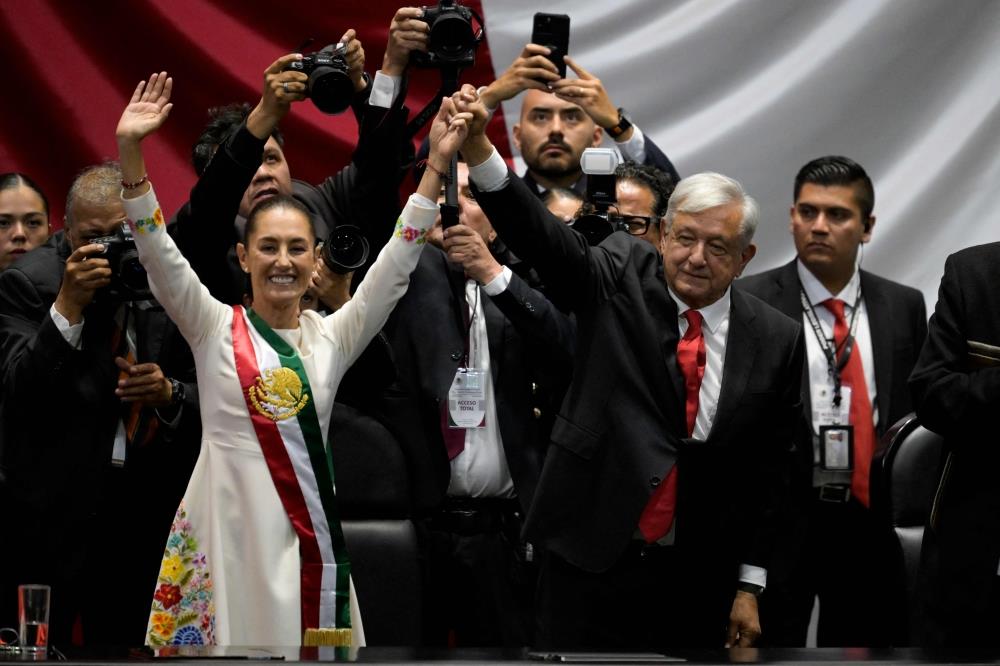
Sheinbaum Takes Office As Mexico's First Woman President
Mexico City: Claudia Sheinbaum was sworn in on Tuesday as Mexico's first woman president, inheriting a country beset by gang violence and economic uncertainty over controversial reforms passed by her powerful ruling party.
To cries of "Long live Claudia! Long live Mexico!" the 62-year-old former Mexico City mayor took the oath of office and received the presidential sash in Congress, with foreign dignitaries looking on including US First Lady Jill Biden.
Sheinbaum told cheering lawmakers that, for the first time, "women have arrived to shape the destiny of our beautiful nation," where around 10 women or girls are murdered every day.
She was later due to attend a celebration in Mexico City's main square as leader of the world's most populous Spanish-speaking country, home to 129 million people, which has had 65 male presidents since independence.
Supporters began gathering from dawn on inauguration day, which authorities declared a national holiday.
"We arrived at five in the morning," said Marta Ramirez, a housewife who came by bus from the central city of Leon.
Mexico's new President Claudia Sheinbaum delivers a speech after being sworn-in during the inauguration ceremony at the Congress of the Union in Mexico City on October 1, 2024. (Photo by Alfredo Estrella / AFP)
A woman president "understands the people better," she said.
One high-profile absence at the ceremony was Spanish King Felipe VI, whom Sheinbaum refused to invite, accusing him of failing to acknowledge harm caused by colonization.
In response, Spain announced it would boycott the inauguration, despite its strong economic and historic links with Mexico.
Popular predecessor retires
A scientist by training, Sheinbaum won a landslide victory in June elections with a vow to continue the left-wing reform agenda of outgoing leader Andres Manuel Lopez Obrador, a close ally.
Lopez Obrador leaves the presidential palace after six years due to the country's single-term limit, despite an approval rating of around 70 percent, largely thanks to his policies aimed at helping poorer Mexicans.
He bequeaths Sheinbaum the leadership of a nation where murders and kidnappings occur daily and ultra-violent drug cartels control vast swaths of territory.
Spiraling criminal violence, much of it linked to drug trafficking and gangs, has seen more than 450,000 people murdered in Mexico since 2006.
While Sheinbaum has pledged to stick to the outgoing president's controversial "hugs not bullets" strategy -- using social policy to tackle crime at its roots -- experts expect some changes in her approach.
"It will be a modified version of hugs not bullets that will be more reliant on intelligence and therefore more effective at getting things done," said Professor Pamela Starr, an expert on Mexico at the University of Southern California.
Reassuring investors
The new president will also have to deal with the fallout from a row over newly passed judicial reforms that will make Mexico the world's only country to elect all judges by popular vote.
Dozens of judicial workers demonstrated on Tuesday morning near Congress -- the latest in several weeks of protests.
Lopez Obrador argued the reforms were needed to clean up a "rotten" judiciary serving the interests of the political and economic elite.
The changes, which critics argued would make it easier for politicians and organized crime to influence the courts, upset foreign investors as well as key trade partners the United States and Canada.
Sheinbaum sought to ally such concerns, telling investors their money "will be safe" and pledging a "responsible fiscal policy."
The United States, Canada, and Mexico "know that economic cooperation strengthens the three nations," she added.
Experts think Sheinbaum is likely to maintain good relations with whoever wins the US election on November 5 -- particularly if it is Democrat Kamala Harris, who would also be her country's first woman president.
While there will still be "some tension and friction," especially over migration, both countries need each other and Sheinbaum is likely to be "much more pragmatic" than her predecessor, said Maria Fernanda Bozmoski, deputy director of the US-based Adrienne Arsht Latin America Center.

Legal Disclaimer:
MENAFN provides the
information “as is” without warranty of any kind. We do not accept
any responsibility or liability for the accuracy, content, images,
videos, licenses, completeness, legality, or reliability of the information
contained in this article. If you have any complaints or copyright
issues related to this article, kindly contact the provider above.


















Comments
No comment